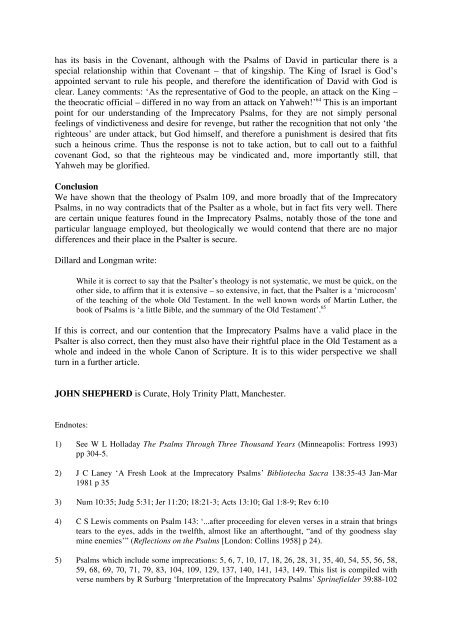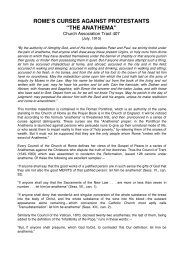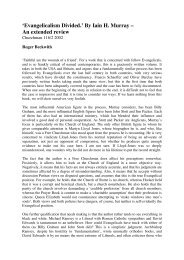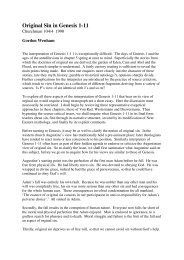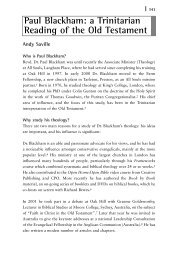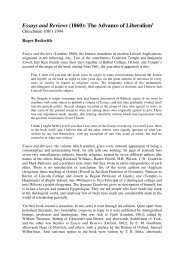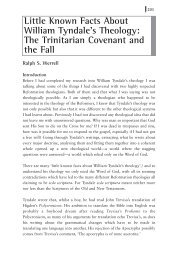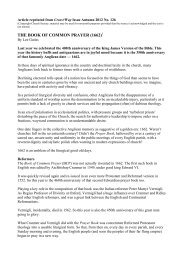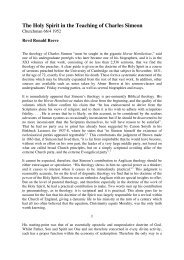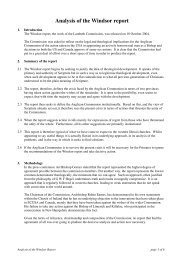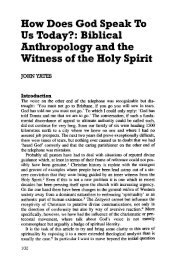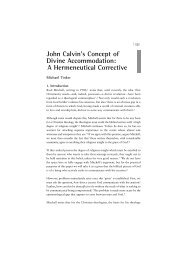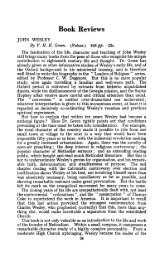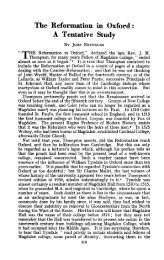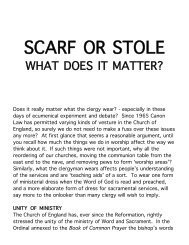The Place of the Imprecatory Psalms in the Canon ... - Church Society
The Place of the Imprecatory Psalms in the Canon ... - Church Society
The Place of the Imprecatory Psalms in the Canon ... - Church Society
You also want an ePaper? Increase the reach of your titles
YUMPU automatically turns print PDFs into web optimized ePapers that Google loves.
has its basis <strong>in</strong> <strong>the</strong> Covenant, although with <strong>the</strong> <strong>Psalms</strong> <strong>of</strong> David <strong>in</strong> particular <strong>the</strong>re is a<br />
special relationship with<strong>in</strong> that Covenant – that <strong>of</strong> k<strong>in</strong>gship. <strong>The</strong> K<strong>in</strong>g <strong>of</strong> Israel is God’s<br />
appo<strong>in</strong>ted servant to rule his people, and <strong>the</strong>refore <strong>the</strong> identification <strong>of</strong> David with God is<br />
clear. Laney comments: ‘As <strong>the</strong> representative <strong>of</strong> God to <strong>the</strong> people, an attack on <strong>the</strong> K<strong>in</strong>g –<br />
<strong>the</strong> <strong>the</strong>ocratic <strong>of</strong>ficial – differed <strong>in</strong> no way from an attack on Yahweh!’ 64 This is an important<br />
po<strong>in</strong>t for our understand<strong>in</strong>g <strong>of</strong> <strong>the</strong> <strong>Imprecatory</strong> <strong>Psalms</strong>, for <strong>the</strong>y are not simply personal<br />
feel<strong>in</strong>gs <strong>of</strong> v<strong>in</strong>dictiveness and desire for revenge, but ra<strong>the</strong>r <strong>the</strong> recognition that not only ‘<strong>the</strong><br />
righteous’ are under attack, but God himself, and <strong>the</strong>refore a punishment is desired that fits<br />
such a he<strong>in</strong>ous crime. Thus <strong>the</strong> response is not to take action, but to call out to a faithful<br />
covenant God, so that <strong>the</strong> righteous may be v<strong>in</strong>dicated and, more importantly still, that<br />
Yahweh may be glorified.<br />
Conclusion<br />
We have shown that <strong>the</strong> <strong>the</strong>ology <strong>of</strong> Psalm 109, and more broadly that <strong>of</strong> <strong>the</strong> <strong>Imprecatory</strong><br />
<strong>Psalms</strong>, <strong>in</strong> no way contradicts that <strong>of</strong> <strong>the</strong> Psalter as a whole, but <strong>in</strong> fact fits very well. <strong>The</strong>re<br />
are certa<strong>in</strong> unique features found <strong>in</strong> <strong>the</strong> <strong>Imprecatory</strong> <strong>Psalms</strong>, notably those <strong>of</strong> <strong>the</strong> tone and<br />
particular language employed, but <strong>the</strong>ologically we would contend that <strong>the</strong>re are no major<br />
differences and <strong>the</strong>ir place <strong>in</strong> <strong>the</strong> Psalter is secure.<br />
Dillard and Longman write:<br />
While it is correct to say that <strong>the</strong> Psalter’s <strong>the</strong>ology is not systematic, we must be quick, on <strong>the</strong><br />
o<strong>the</strong>r side, to affirm that it is extensive – so extensive, <strong>in</strong> fact, that <strong>the</strong> Psalter is a ‘microcosm’<br />
<strong>of</strong> <strong>the</strong> teach<strong>in</strong>g <strong>of</strong> <strong>the</strong> whole Old Testament. In <strong>the</strong> well known words <strong>of</strong> Mart<strong>in</strong> Lu<strong>the</strong>r, <strong>the</strong><br />
book <strong>of</strong> <strong>Psalms</strong> is ‘a little Bible, and <strong>the</strong> summary <strong>of</strong> <strong>the</strong> Old Testament’. 65<br />
If this is correct, and our contention that <strong>the</strong> <strong>Imprecatory</strong> <strong>Psalms</strong> have a valid place <strong>in</strong> <strong>the</strong><br />
Psalter is also correct, <strong>the</strong>n <strong>the</strong>y must also have <strong>the</strong>ir rightful place <strong>in</strong> <strong>the</strong> Old Testament as a<br />
whole and <strong>in</strong>deed <strong>in</strong> <strong>the</strong> whole <strong>Canon</strong> <strong>of</strong> Scripture. It is to this wider perspective we shall<br />
turn <strong>in</strong> a fur<strong>the</strong>r article.<br />
JOHN SHEPHERD is Curate, Holy Tr<strong>in</strong>ity Platt, Manchester.<br />
Endnotes:<br />
1) See W L Holladay <strong>The</strong> <strong>Psalms</strong> Through Three Thousand Years (M<strong>in</strong>neapolis: Fortress 1993)<br />
pp 304-5.<br />
2) J C Laney ‘A Fresh Look at <strong>the</strong> <strong>Imprecatory</strong> <strong>Psalms</strong>’ Bibliotecha Sacra 138:35-43 Jan-Mar<br />
1981 p 35<br />
3) Num 10:35; Judg 5:31; Jer 11:20; 18:21-3; Acts 13:10; Gal 1:8-9; Rev 6:10<br />
4) C S Lewis comments on Psalm 143: ‘...after proceed<strong>in</strong>g for eleven verses <strong>in</strong> a stra<strong>in</strong> that br<strong>in</strong>gs<br />
tears to <strong>the</strong> eyes, adds <strong>in</strong> <strong>the</strong> twelfth, almost like an afterthought, “and <strong>of</strong> thy goodness slay<br />
m<strong>in</strong>e enemies’” (Reflections on <strong>the</strong> <strong>Psalms</strong> [London: Coll<strong>in</strong>s 1958] p 24).<br />
5) <strong>Psalms</strong> which <strong>in</strong>clude some imprecations: 5, 6, 7, 10, 17, 18, 26, 28, 31, 35, 40, 54, 55, 56, 58,<br />
59, 68, 69, 70, 71, 79, 83, 104, 109, 129, 137, 140, 141, 143, 149. This list is compiled with<br />
verse numbers by R Surburg ‘Interpretation <strong>of</strong> <strong>the</strong> <strong>Imprecatory</strong> <strong>Psalms</strong>’ Spr<strong>in</strong>efielder 39:88-102


